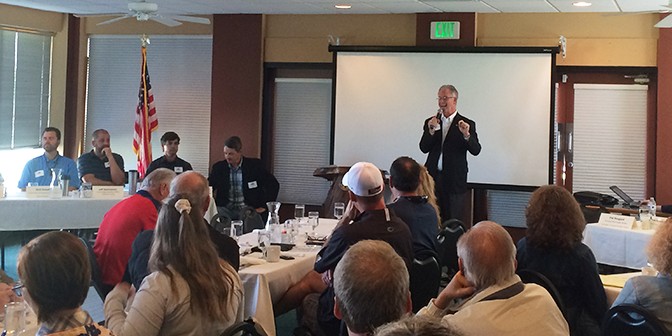(Photo above: CID-COAR Cannabis Panel | photo by David Clewett)
Central Oregon Realtors gathered Friday, October 9 to discuss the risks of leasing and selling property to marijuana businesses. The consensus was that most commercial real estate firms will not readily lease to tenants intending to use the property for marijuana business due to the risks involved.
The CID-COAR Meadow Lakes Cannabis Panel was organized by CID President Louie Hoffman and brought togetherCentral Oregon real estate brokers to discuss the risks and learn about marijuana law and land use regulations as it pertains to their industry.
Compass Commercial Real Estate Partner and Principal Broker Pat Kesgardserved as event moderator Michael Hughes is a lawyer in Bend who works closely with cannabis businesses and marijuana law. His panel participation offered realtors a chance to learn about marijuana law and address their concerns.
“I think marijuana businesses should buy and not lease because leasing puts them in a tough situation with the landlord,” Hughes said. “I suggest that people in real estate sell property to the cannabis industry because there is a tremendous amount of money to be made.”
One of the most prevalent issues is obtaining a federally backed loan because although marijuana is legal for adults in Oregon it is still considered an illegal substance under federal law.
Hughes offered caution to realtors saying that “until congress changes the banking laws businesses will operate with cash. That will be a major public safety issue leading to money laundering and cash only businesses and potential theft with all that money sitting around.”
Kesgard raised another concern that “if you are renting to residential tenants with a home grow the house could blow up or neighbors might complain of the smell. Then it becomes a landlord issue.” He added that “anybody can buy a building and use it for their purposes as long as it is legal. When you are leasing from an owner it puts that owner at risk. From Compass Commercial’s perspective we cannot put our clients in jeopardy because it is a schedule one drug.”
Brian Fratzke of Fratzke Commercial Real Estate said that the event was very educational for all in attendance. Regarding marijuana businesses he said “we will sell a building to you but we won’t lease because if I don’t know the rules I don’t know how to limit my liability. It’s complicated with federal and state laws so why take the risk? Once we can guarantee we aren’t liable in a deal we will get involved.”
Fratzke added that the “laws and rules are there for liquor and tobacco but not yet for marijuana. We just have to be really careful. We will be open to marijuana businesses when the FEDS declassify marijuana as a class one narcotic.”
Andie Edmonds, partner at NAI Cascade, said her firm doesn’t have a set policy surrounding cannabis businesses but always advise landlords to talk to their attorneys.
“Most mortgages are federally insured which requires the use of the property to be legal,” Edmonds said. “Federally speaking cannabis businesses are not legal. This means technically a loan could be called. So most landlords won’t take the risk.”
Regarding representing the business as a tenant Edmonds said that “there are so many regulations surrounding placement of the business appropriately that it opens up the broker and the brokerage to a disproportionate amount of risk.” She also noted that not all brokers are unwilling to work with marijuana dispensaries and that “there is no prejudice against the industry but there is a risk inherent to the industry because federally it still isn’t legal.”
Although most brokerage firms are resistant based on the risks involved others are leasing as is evidenced by the many dispensaries open in Bend.
Representatives from around Central Oregon provided a brief summary about how they are approaching marijuana law and businesses in their city and county. With unique local land use regulations in each county realtors face a challenge in making sure they are current with local laws regarding marijuana businesses.
Prineville Senior City Planner Josh Smith said that, “In Prineville we have designated Baldwin Industrial Park for marijuana businesses. If it’s not happening up there it’s illegal.” He added that the “enforcement side is going to be difficult. If you are selling property in Prineville I would advise to stay away from marijuana businesses.”
AmeriTitle Senior Examiner for Prineville, Dave Williams said that “as of right now we won’t close escrow involving controlled substances. It is tough knowing and keeping updated on all the laws.”
AmeriTitle Assistant VP & GM for Prineville, Justin Homan said that “there are a lot of pieces to the puzzle and a lot of unknowns. We currently have one underwriter that can do the escrow side but lawyers don’t want to touch it.”
Prineville Police Captain Dale Cummins spoke about the damages home grow operations can do to residential rentals. He said that “there are many issues including mold when you rent to a home grow. It is an issue for landlords. We have seen tenants turning rentals into home grows and destroying a home. Butane extraction is also very dangerous.”
While real estate brokers remain cautious they all clearly want to protect themselves against the risks until the laws are refined at a local, state and federal level. As is the current case with the cannabis industry many involved are treading lightly until laws are more clearly defined.





